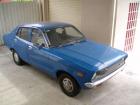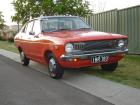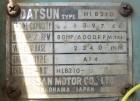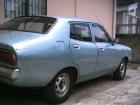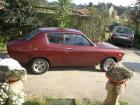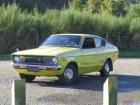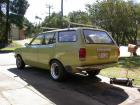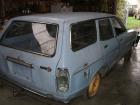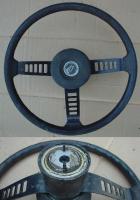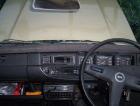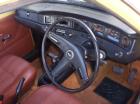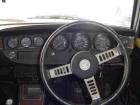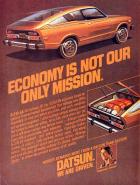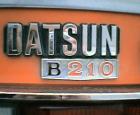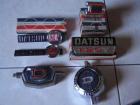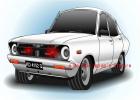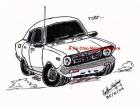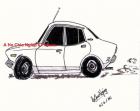| Revision as of 23:42, 1 March 2009 Ddgonzal (Talk | contribs) (->Honey Bee) <- Previous diff |
Revision as of 23:54, 1 March 2009 Ddgonzal (Talk | contribs) (->1975 Standard Model) Next diff -> |
||
| Line 308: | Line 308: | ||
| And the good part: | And the good part: | ||
| * 10 pounds lighter than Deluxe model 2-dr sedan | * 10 pounds lighter than Deluxe model 2-dr sedan | ||
| - | |||
| = Donor Parts = | = Donor Parts = | ||
Revision as of 23:54, 1 March 2009
Nissan chassis model B210 was the third-generation Sunny. They were sold during Model years 1974-1978 and marketed in various countries as the Datsun B-210 or Datsun Sunny. In some countries it was designated Datsun 120Y or Datsun 140Y, depending on the engine fitted. The B210 was designed to be more luxurious than the spartan B110, so it has a 40mm longer Wheelbase, and is considerably heavier than the original Datsun 1200.
It is common to confuse the "Datsun B-210" (B210) with the "Datsun 210" (B310), but they are different generations altogether, sold during different years. For more details and how the Sunny family was developed, see History of Datsun 1200.
Contents |
Variations
Model Prefix
- HB210 - High grade engine (A14)
- PB210 - Excellent 1400, separate model line for 1974-1975 with L-series engine
- GB210 - Excellent 1600 (L16) from 1976 February
Chassis Identification under-hood plate:
Models
- B210 4-dr sedan
- B210R 2-dr sedan
- KB210 Coupe (in hatchback form, unlike KB110 fastback which had no hatch)
- VB210 2-dr Wagon (van)
- Truck: the 120Y Truck is actually a B120, not a B210-based model
- VB210 Panel Wagon (some countries) -- not a JDM factory offering?
Series
B210 could be divided into two series:
- 1974-1975 models
- 1976-1978 models
Trim
- Standard - least expensive model
- Semi-Deluxe - for Vans
- Deluxe - upgraded model
- Super-Deluxe - for Vans
- GL (Grand Luxe) - luxury model
- GX (Grand Luxe special), available as 4-dr or Coupe
- JDM: GX models had the A12T or A14T twin-carb engine
- USA: GX models had a standard A14S (single-carb engine)
Common rectangular-gauge dash:
High-line round-gauge dash (JDM GL Coupe and GX Coupe):
Design
The B210 was the third-generation Sunny, replacing the B110. The theme for the B210 re-design included:
- improvement "to be more likeable and satisfactory to a greater number of people".
- Exterior design: style of "Streamline and a Cut" with "Young and Dynamic" image -- instead of the "rational" styling of the B110. "Sharp and Soft" atmosphere, "Long-nosed proportion" (long wheelbase?), and "Streamed and Dynamic" style.
- Interior design: "Oval Scoop Cockpit"
- Increased driver roominess. Front compartment larger, rear compartment smaller
- Quieter operation (reduced NVH)
reference: Service Bulletin Vol. 188 "Introduction of New Datsun B210 Series", Nissan Motor Co., Ltd., Tokyo, Japan, 1973.
The side panel is finished by plum faces and sharp folds all over, and the stream of the fold and roof drip like an ebbing wave keeps sharpness in the free and easy touch.
Others have simply called it "coke-bottle" styling -- dynamic with a pinched waist.
One oddity about the B210 is that the bonnet latch release was moved from inside the car to outside. In this feature it was inferior to the B110. By 1976 it was moved back inside.
Powertrain
Engine
Most B210s outside of North American were fitted with the redesigned A12 engine, hence the 120 in "120Y". North American models were fitted *only* with the high-line engines, namely the A13 for 1974, and the A14 for 1975-1978.
JDM GX models used the twin-carb engines (A12T or A14T). USA GX models use the single-carb engine (A14S).
Transmission
A12 and A13 models were fitted with the 56-Series transmission, a four speed. A14 models, having extra torque, required a heavier-duty transmission so the the 60-Series transmission 4-speed was fitted.
A12T Five-speed models (GFK, 1973-1974) used the 56-series 5-speed.
A14 Five-speed models (GFK, 1976-1978) used the large 63-Series transmission.
Differential
1974-1975 models with A12 and A13 models used the Hitachi H145 differential.
A14 models used the H150 differential, which was rated to cope with the extra torque.
1976-1978 models all used the H150, including A12 models.
Brakes and Suspension
All North American B210s used the large disk brakes from the PB210 series, along with heavy-duty steering linkage from the Datsun 610.
Early A12 models used front drum brakes and lightweight steering linkage. 76-78 A12 models used a lightweight disc brake with heavy duty steering linkage.
Spring rates are nearly identical to Datsun 1200, even though the B210 was 20-25% heavier. This resulted in a noticeably smoother ride.
B210 SSS
Datsun-Nissan New Zealand sold a special model, the SSS.
Honey Bee
The Datsun B-210 Honey Bee was a special low-cost model offered in the United States. It was the low-spec Standard model with no carpeting, but could be had with a special stripe and Bee decal. Its goal was to sell to a young, first time buyer who could not afford a regular B210. Honey Bee was only offered as a 2-dr sedan.
See main article: B210 Honey Bee
Fuel Economy Champions
41 mpg: 1974 USA model with A13 engine:
48 mpg with A14
50 miles per gallon with A14 engine and 5-speed:
This was the peak of Nissan fuel economy, at least in a regular size (over 660 cc) car.
Badges
JDM
B210 - the original design
- from 1973 to late 1975
B211 - the redesign (minor facelift)
- Sedan, Coupe from December 1975
- Van continues as B210, but upgraded in October 1975
USA
In the United States, the B210 was marketed as the "B-210" (with a hyphen). NOTE: It was not the 210, that is a newer Datsun.
Serial Numbers
1974 Model years
- HLB210-000001 to ~070000
- HLB210-400000 to ~510000
1975 Model Year
- HLB210-070001 to ~140000
- HLB210-510001 to ~710000
1975 Standard Model
- starting with HLB210-578528 and mixed among deluxe models
1976 Model Year
- HBL210-140001 to ~184390?
- HLB210-710001 to ~793936?
1977 Model Year
- HBL210-184391 to ~233661?
- HBL210-793937 to ~830000
- HBL210-870216 to ~900000
- HBL210-922771 to ~999999
1978 Model Year
- HBL210-233662 to ~310000
- HBL210-353322 to ~400000
1974
For the 1974 Model Year the goals were:
- conforming to anti-pollution regulations
- EGR added
- Air Compensator now standard
- requirements of FMVSS
- notably large heavy bumpers
- starter interlock
One of the most obvious changes from the B110 -- other than the all-new sheet metal -- is the large 5-mph "park bench" safety bumpers of the type fitted to all 1974 USA autos.
Since both affected performance, only the high-grade A13 engine was offered (model HLB210) to keep performance on par with the lighter Datsun 1200.
A13 Engine for USA market: see wikipedia:Nissan A engine.
- New 1974 A Engine Redesign common to all A-engines
- Tall-block engine (like A14) 30 mm higher than previous A12
- 77 mm stroke, up from 70 in A12 engine. Bore same as before
Also causing some consternation was an incredibly complicated starter interlock. A seven-input (!) transistor "brain box" prevented the engine from being started if the driver's seat was occupied but the belt unfastened.
Seat belts for 1974 were 3-point, but unlike B110 the shoulder belt is semi-permanently fastened to the seat buckle (no need for a zip tie). Also the inboard belts have a round flexible-wire design so they don't fall down around the seats when not in use. This is a good swap for the B110 belts.
1975
For 1975, the main design points were:
- Introduction of the California-destined model (Chassis Code suffix 'N')
- Introduction of factory Air conditioning. Previously, only dealer-installed Aircon was available
- As usual, emission and safety requirement changes
Because of the performance-robbing emission and weight-gain changes in the USA market, the larger A14 Engine was adopted to keep performance on par with last year's model. This triggered a cascade of parts changes, including:
- Intro of A14 Engine
- stronger 4-speed 60-Series Transmission instead of the 56-series fitted to A12 engines. It has a higher first gear
- Heavier clutch to handle increased engine torque output (now 794 lbs, up from 694 lbs for A13 engine)
- stronger H150 Differential
- New axle housing
- shorter Propeller Shaft
- 140 mm (5.55") wider Radiator core
- Fan Shroud now standard equipment
- Longer front coil springs
- stiffer rubber Engine Mounts
- Automatic Transmission changed from air-cooling to water cooling
- Intro of Air Pump to Sunny family
- Cylinder head recast with air passage to each exhaust port
- Port for anti-backfire valve added to Intake manifold
- Evaporative changes from crankcase-storage to charcoal cannister
- Intro of spark delay valve
- Leaner carb settings:
- Improved heating duct
- PTC Automatic Choke
- Larger exhaust stove from 610 adopted
- Remove engine compartment heat from engine
- Intro of fresh-air ducted air cleaner
- Two-stage idle compensator
- Heat Shielding:
- plate around carb
- insulator between throttle body and center body
- shield between intake and exhaust manifolds
- stainless bolts in carb (to lessen heat transfer)
- stainless bolts for manifold mounting
California Model: In 1975, California had a population of 20+ million. This size made it a very important market to international companies, so when California legislated the strictest emission limits in the world, the automakers said "Yes, Sir!"
- Intro of catalytic converter, which made the following needed:
- Modified fuel filler and hose
- Modified floor pan
- Modified driver's seat (thinner, and cutaway on inside). Driver's inner seat belt also redesigned slightly
- Converter Floor temperature warning lamp
- Floor insulation (full jute padding)
- Routing of fuel, brake and EVAPO tubes rerouted under car: Along outside stiffener instead of in tunnel
- Exhaust piping insulators
- Intro of fully-transistorized ignition, adapted from 240Z. See B-210 Electronic Distributor Swap
- Altitude compensator (for high-altitude markets within California)
Safety:
- bumper overriders add (rubber bumperettes, a la B110) to meet the Cost Saving Act. 1974 models had 'smooth' bumpers
- Illuminated light switch introduction
- Brake Hose Marking (FMVSS No. 106)
- Bumper height requirements (FMVSS No. 215), raised ~ 2 inches
Misc:
- 50A Alternator (LT150-19) now fitted instead of 35A
- Adoption of 610 Voltage Regulator (TL1Z-82)
- Engine crossmember clearnanced slightly for aircon compressor
Cool Changes for 1975:
- Wood-grain shift knob (Canada only)
- Three-spoke steering wheel (Canada only)
- Speedometer with trip meter now standard!
- Door Mirror mounted 100 mm forward relative to 1974 model
- Intro of ingition relay switch (California only), no more burned switches?
1975 Standard Model
In the height of the Fuel Crisis and economic problems, Nissan introduced for the first time to the american market a Standard (base) model Sunny. It was a low-cost 2-dr sedan.
Standard models have an 'S' suffix in the model number
This also marked the introduction of the B-210 Deluxe name (fitted to all existing sedans), to differentiate it from the new standard model sedan.
This is the difference, among other deletions, this equipment is not fitted:
- Wheel covers (no hubcaps!)
- Spare tire cover
- Trunk mat
- Cigarette lighter (blind plug fitted)
- Speedometer trip meter
- Rear window defogger switch (blind plug fitted)
- Carpet (only Mat). California still gets carpet :-)
- Arm rest (pull handle is fitted)
- Door trim moulding
- Rear side moulding
- Rear seat ashtray
- Wiper blade high-speed fin (uses basic type from 620 truck)
- Door lamp switch for assitant side
- Console box
- Non-glare glass (optional on Deluxe)
- Chrome moulding for windshield
- Chrome moulding for rear window
Changed Equipment:
- Blackwall tires now fitted (optional on Deluxe models)
- Trunk finisher: hardboard instead of laminated
- Front seat is folding only, instead of reclining + forward-folding
- Interior Trim: Black or Beige only (Deluxe has Black, Blue or Brown)
- Floor trim: Black only (Black or Brown in California)
And the good part:
- 10 pounds lighter than Deluxe model 2-dr sedan
Donor Parts
- Many 510 and 610 steering, suspension and brake parts fit B210
- Many parts from B210 will fit B110 (and vice-versa). See article: B210 Parts Donor
- See General parts for a list of many parts like headlights, battery, etc from most cars that fit will B210.
- Steering parts
- Steering gear is same as 610, size 45 mm gear spacing. 15.0 ratio, 3.14 turns lock/lock @ 38 degrees
- Steering column is separate from gear (B110 has integral gear/column)
- Side rod is size of 610, but different length
- Cross rod, differs from 610 in bend and size
- Idler: same as 610
- Gear arm: same as 610
- Front suspension and brakes: Many Datsun 610 parts fit B210 (USA models). These differ from B110
- Tranverse link: 510/610 part
- Ball joint: 610 part
- Wheel bearing: 510/610
- Hub: 510/610
- Rotor 232 mm same as 510/610. B110 uses 212.5 mm
- Caliper and pads: Annete 14/15A same as 610 (B110 uses 12/14A)
- Strut interior parts (or insert). Larger diameter than B110
- Brakes
- M45 Master Vac (booster) same size, but differs from 510/610
- Brake master cylinder 5/8 bore, part is same as 610. Same bore as B110, but different mounting.
- NP proportioning valve same as 610 (B110 has no valve)
- Engine crossmember (wider than B110)
- Diff U-bolts and mounting pads (wider)
- Rear Wheel bearings (larger)
- Lug nuts. B210 uses larger 13/16 size. B110 uses 3/4 size
For a list of B110 parts that fit B210, see B210 Parts Donor.

![[Datsun 1200 encyclopedia]](/wiki/upload/wiki.png)
